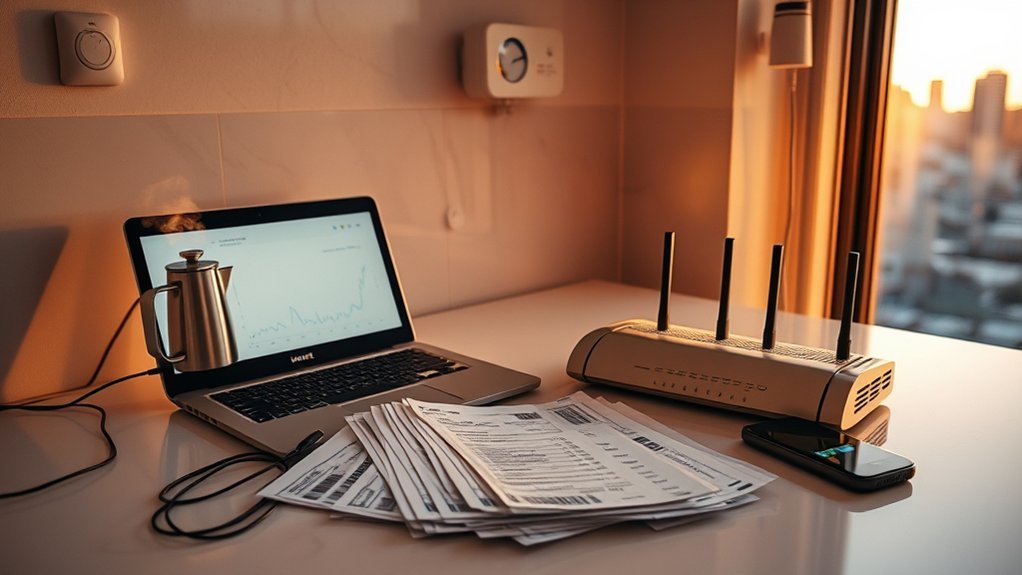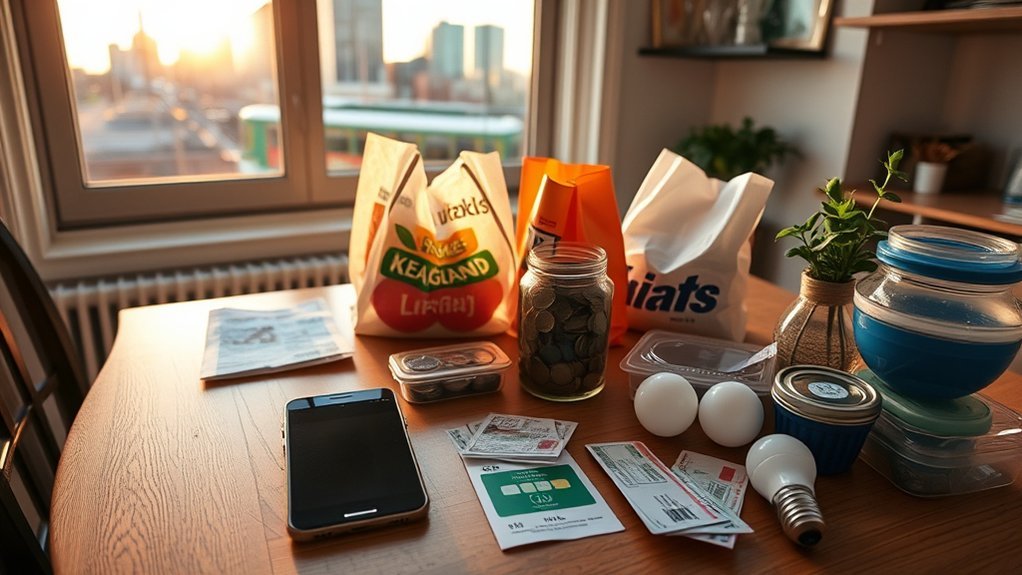If you’re planning life in Kansas City, you’ll want a clear, numbers-first view of what monthly living really costs. Rent, utilities, groceries, transport, and healthcare all add up differently depending on neighborhood and household size. I’ll break down typical rents, utility averages, grocery and transit expenses, plus sample monthly budgets for singles, couples, and families — and point out practical ways to cut costs so you can plan with confidence.
Housing Costs: Rent vs. Buying in Kansas City

If you’re weighing rent versus buy in Kansas City, the numbers make the trade-offs clear: average one‑bedroom rent runs about $910–$1,134 (citywide averages near $1,295), while median home prices commonly sit between roughly $176,000 and $460,000 — city medians often around $229,000–$459,000 and statewide near $290,000.
You’ll find Kansas City rent stays well below many national metros, so your monthly housing costs look comparatively favorable whether you rent or buy. Use the median home price ranges to model mortgage payment scenarios: a $265,000 loan at roughly 6.9% produces about a $1,783 monthly mortgage payment, showing buyers often pay more upfront but may save long term. Renters can spend up to $300 more per month than homeowners in some comparisons. Building a house can often be more expensive than buying an existing home, making it essential to analyze your options.
To follow the 30% rule, a $1,134 one‑bedroom rent implies needing about $3,402 gross monthly income. That helps put cost of living Kansas choices into practical perspective.
Monthly Utilities and Telecom Expenses

You should expect to pay roughly $220–$320 a month for energy and basic utilities in Kansas City, with local energy bills averaging about $222.78 (≈7% above the national energy average).
Phone and internet commonly push the total higher — typical phone costs are about $201.70 and a full bundle including internet often brings the monthly bill to roughly $599.94.
Budget between $200 and $600/month depending on your dwelling size and service choices, and prioritize efficient heating, comparison shopping for telecom plans, and seasonal adjustments to keep costs down. Regular inspections recommended to identify issues early can help maintain efficient energy use and reduce overall utility expenses.
Energy and Heating Costs
Because seasonal temperature swings drive higher energy use, expect Kansas City utility bills to be noticeably uneven across the year: basic utilities (electricity, water, gas, sewer) average about $319.94 monthly in Kansas, with local energy bills around $222.78 (roughly 7% above the national energy average), while telecom pushes combined monthly utility and phone/internet costs to about $599.94 — just under the national combined average of $609.90.
You’ll see heating costs spike in winter and cooling demand in summer; electricity rates and seasonal energy use make monthly utility expenses variable. Focus on insulation and efficient thermostats to lower bills. Typical one-bedroom utilities average $253.53 monthly with electricity about $148.58.
Key actions:
- Track monthly energy bills and compare usage.
- Seal drafts, upgrade insulation, program thermostat.
- Replace old appliances with ENERGY STAR models.
Phone and Internet
Start by itemizing your phone and internet costs so they don’t sneak up on you: typical monthly phone bills around Kansas City run about $200–$202, slightly above the national average (~$194), and when you add internet plus basic utilities the combined monthly total lands near $600 (~$599.94).
You should budget the average phone bill with internet and basic utilities in mind: Kansas’ utilities average roughly $319.94/month, and energy alone is about $219–$223.
City-level phone costs in Kansas City mirror state trends, with telecom expenses roughly 7% higher than national phone averages.
For clear, data-driven planning, treat monthly telecom costs (phone + internet) as a defined line item within that ~$600 combined figure.
Utility Budgeting Tips
When planning your monthly budget, treat utilities and telecom as a single line item of about $600 — roughly $320 for basic utilities (electricity, water, gas, sewer) plus about $280 for phone and internet — and build in a seasonal buffer since Kansas City’s energy costs (around $220–$223/month) run about 7% above the national average.
Use these utility budgeting tips to keep monthly utilities predictable and lower overall spend.
- Shop and bundle phone and internet plans to cut that ~$280 telecom slice.
- Reduce energy bill spikes with thermostat setbacks, LED bulbs, and efficient appliances.
- Track usage monthly, note seasonal patterns, and set a savings buffer for high heating/cooling months.
Treat utilities as predictable recurring costs and adjust budget lines each quarter.
Grocery and Food Price Breakdown

Dig into grocery costs in Kansas City and you’ll find staples that keep weekly bills predictable: milk runs about $4.70 a gallon, a loaf of bread about $3.67, and a dozen eggs roughly $3.17. Use those anchors when planning average monthly grocery spending: estimates put family of four food costs near $800, while single adult groceries typically fall between $261 and $438 depending on habits.
Meat and produce prices shift totals — steak averages $15.52 per pound, ground beef $6.97, potatoes about $5.06 (likely a 5‑lb bag), lettuce $1.88, and bananas $0.73 each — so prioritize cuts and seasonal produce to trim expenses. Compare eating out vs cooking: low‑end restaurant meals run $12–$18 per person, so cooking at home usually saves money if you buy staples, plan meals, and use bulk proteins strategically. Track receipts weekly to see where you can swap brands or substitute produce without sacrificing nutrition. Additionally, understanding repair costs for technology used in schools can help budget effectively for educational resources.
Healthcare and Personal Care Costs

Although healthcare and personal care costs can feel unpredictable, Kansas City has clear local averages you can use for budgeting. You’ll find Kansas City healthcare prices are moderate: a typical outpatient doctor visit runs about $95.79, a routine dentist appointment averages $108.20, and an optometrist check-up is roughly $95.10. Factor in over-the-counter meds like ibuprofen (~$10.97) and personal grooming — haircuts around $22.17 and beauty salon visits near $34.80.
Kansas City healthcare costs are moderate — expect roughly $95 doctor and optometry visits, $108 dental, plus modest OTC and grooming expenses.
Use these numbers to estimate monthly and annual spend. For example, local annual family medical costs for two adults and two children average about $8,197; divide that into monthly projections to compare with premiums and out-of-pocket costs. Practical steps: prioritize preventive visits, confirm in-network providers, and track receipts to spot trends. Additionally, investing in a portable jump starter can save you from unexpected roadside assistance costs.
- Doctor visit: $95.79 average
- Dental check: $108.20 average
- Optometry: $95.10 average
These data points help you plan realistic healthcare costs in Kansas.
Transportation: Driving, Insurance, and Transit Options

Because most people in Kansas City drive, you’ll want to budget for roughly $300 a month in gas (about $3.06/gal), monthly car payments of $332–$762 for a 60‑month loan with $5K down at ~7% APR, and about $2,674 a year for insurance; alternatively, RideKC fares start at $1.50 with a $50 monthly pass and the downtown KC Streetcar is free, so using transit can cut your total transportation spend substantially — use RideKC.org and its True Cost of Driving tool to compare exact tradeoffs for your routes.
You’ll add parking, maintenance and registration to baseline monthly gas costs and car payments, raising true ownership costs beyond the loan and fuel.
If you shift to public transit, you’ll save on auto insurance and many ownership expenses, though expect longer trips and less flexibility.
Use RideKC trip planning and the True Cost of Driving calculator to model commute-specific savings, then weigh convenience versus the clear, data-driven monthly savings potential. Additionally, owning a portable jump starter can provide peace of mind by avoiding unexpected battery-related expenses.
Typical Monthly Budgets: Single, Couple, and Family of Four

When you map out monthly costs in Kansas City, expect very different numbers depending on household size: a single person will typically need about $3,000 a month (with one‑bedroom rent near $1,134–$1,307 and utilities ~$254–$320), a couple usually lands in the $3,000–$4,000 range depending on rent and lifestyle (median two‑bed rent ~$1,338), and a family of four in our example needs roughly $7,750/month (~$93,000/year) to cover housing (mortgage ~$1,783), groceries (~$800), childcare (~$900 per child), utilities (~$350), fuel (~$300), dining out (~$600) and still save about $2,212. Additionally, understanding the initial startup costs associated with running a group home can provide valuable insights for budgeting in Kansas City.
You’ll want a simple baseline to compare options and plan savings against Kansas City cost of living and median home prices.
Focus on average monthly rent and recurring essentials: groceries and utilities drive predictable spend, while healthcare and gas vary.
Use the three example budgets below to estimate your needs:
- Single: ~$3,000 (one‑bedroom rent $1,134–$1,307, utilities $254–$320).
- Couple: $3,000–$4,000 (two‑bed median rent ~$1,338).
- Family of four budget: ~$7,750/month.
Ways to Save: Practical Cost-Cutting Strategies

You can cut food costs substantially by cooking more at home—basic groceries like milk ($4.70), eggs ($3.17), bananas ($0.73) and ground beef ($6.97) are far cheaper than the ~$600/month many spend eating out.
Shift driving habits to public transit or carpooling (bus fare $1.50, monthly pass ~$50, KC Streetcar free) to lower the typical ~$300/month family gas spend.
Also buy generic brands and trim subscriptions so modest changes in groceries, transport, and discretionary spending can add up to hundreds saved each month. Additionally, investing in essential items for a home gym can provide long-term savings on fitness expenses.
Cook More at Home
Cooking more at home cuts your meal cost dramatically: basic groceries — bread $3.67, milk $4.70/gal, eggs $3.17/dozen, bananas $0.73 each, ground beef $6.97/lb — generally cost a fraction of even a low‑end restaurant meal ($12–$15).
You’ll lower food costs by shifting meals from restaurants ($600/month example) into groceries ($800/month example family) and savings. Use meal planning and cook more at home to avoid impulse dining.
- Plan weekly menus: shop with a list, buy seasonal produce (lettuce $1.88, bananas $0.73) and cheaper proteins.
- Batch-cooking: cook in bulk, freeze portions to stretch ground beef $6.97/lb and potatoes $5.06.
- Cost swaps & timing: choose whole chicken vs steaks, prep during off‑peak hours to curb energy and phone waste.
Use Public Transit
Often, swapping most car trips for RideKC transit can shave roughly $300 a month off your transportation bill: a $50 monthly bus pass (or $1.50 single-ride fare) replaces gas, parking, and parts of insurance and loan costs while the free KC Streetcar removes short-trip parking fees downtown.
In Kansas City, use RideKC’s transit pass and compare the monthly cost to the true cost of driving with their calculator — factoring local gas (~$3.00/gal), wear-and-tear, and avoided car payments ($332–$762/mo).
Buy a reloadable card or multi-ride pass, plan routes on RideKC.org or the Transit app, and mix occasional rideshares for last-mile trips.
This data-driven approach cuts overall vehicle ownership pressure and delivers measurable savings.
Buy Generic Brands
Frequently, switching to generic brands is one of the fastest, data-backed ways to cut monthly expenses without sacrificing quality. You can trim your groceries line (about $800/month) by 20–30% — roughly $160–$240 saved — by choosing store-brand staples.
Apply the same approach to household essentials and cleaning products to lower the $350 home utilities/maintenance category. Generic over-the-counter meds (ibuprofen) are often 30–70% cheaper than name brands.
Look at telecom and personal care: switching to lower-cost carriers, generic-brand devices, or basic salon packages reduces that $200 phone and $34.80 haircut pressure on your monthly budget.
- Prioritize store-brand staples.
- Replace name-brand meds.
- Choose in-house services.
Neighborhoods, Market Trends, and Where to Live in KC

Average rent in Kansas gives one-bedrooms roughly $910–$1,146 and a two-bedroom apartment about $920–$1,338 depending on neighborhood. New apartments are concentrated downtown and in the Northland; buying can save roughly $300/month versus renting in some cases. Market trends show modest rent growth (~0.1% month-to-month, ~2.4% year-over-year) and substantial inventory variation by area. To decide where to live, compare neighborhood-specific listings, prioritize commute and school factors, and work with a local agent who can translate median home sale and rent data into practical options that fit your budget. Regular inspections can catch hose issues early and keep your AC system functioning effectively, which is essential in the hot Kansas summers.
Frequently Asked Questions
What Is the Average Cost of Living in Kansas City?
You’ll pay about $3,000–$5,200 monthly on average, varying by neighborhood comparisons; factor commute expenses, utility breakdowns, healthcare access, entertainment costs and food sourcing to budget accurately for Kansas City living.
How Much Money Do You Need to Live Comfortably in Kansas City?
You’ll need about $7,750/month to live comfortably, like a steady river fueling life; factor neighborhood nightlife, commute times, healthcare access, pet expenses, childcare options, outdoor recreation, rent/mortgage, utilities and groceries into that budget.
How Much Should It Cost to Live per Month?
You should plan on about $5,500–$7,800 monthly, covering rent/mortgage, utility bills, grocery shopping, transportation expenses, healthcare costs, an entertainment budget, and steady emergency savings to maintain comfortable, data-driven household finances.
Is Kansas City Affordable to Live?
Yes — you’ll find Kansas City affordable: rent and groceries stay reasonable, commute options include car, bus and free streetcar, nightlife scene and arts culture thrive, pet friendliness is high, and suburban growth boosts housing and grocery access.
Conclusion
You’ll see Kansas City can fit many budgets — rent from about $910–$1,295 for one‑beds, utilities and telecom near $600, groceries $261–$438, and typical monthly totals around $3,000 for singles and $3,000–$4,000 for couples. Test the theory that “KC is affordable” by comparing these figures to your income and priorities: when housing stays under one‑third of take‑home pay, affordability holds. Use the data to plan, adjust, and choose neighborhoods accordingly.


